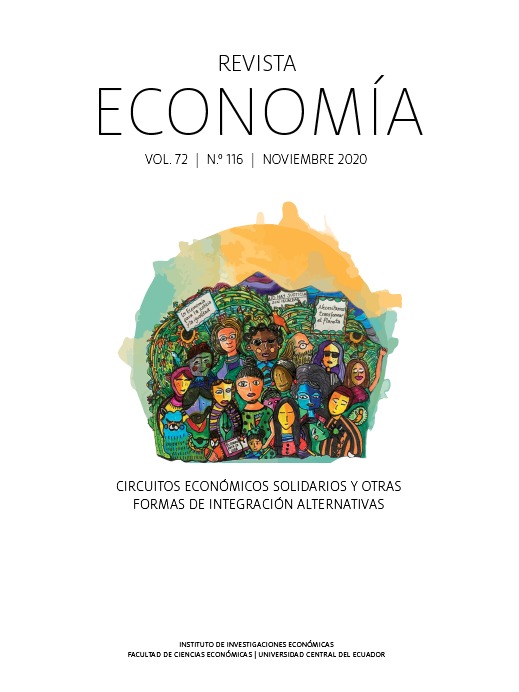Economía social y solidaria en la nueva matriz energética
Main Article Content
Abstract
This paper discusses one of the social relations of Polanyi's coordination mode analysis triad: land (natural resources); concentrating the reflection on a theoretical - and qualitative - plane on renewable energies, considered the energy matrix of the future. We present a narrative that exhibits an interstitial trajectory around that matrix. Although capitalist appropriation is predominant, which a certain aspect of economic thought assumes as one of the axes of the formation of the Sixth Long Wave of Kondratieff, there are also collective practices that constitute the circuit of the social and solidarity economy (SSE) that will dislocate that capitalist formation.
Downloads
Article Details

This work is licensed under a Creative Commons Attribution-NonCommercial 4.0 International License.
The authors who publish in this journal accept the following conditions:
- The authors retain the copyright and assign to the Economics Magazine the right of the first publication, with the work registered under Creative Commons Attribution-NonCommercial 4.0, which enables third parties to redistribute, commercial or non-commercial, of what has been published as long as the article circulates completely and without changes.
- Authors can make other independent and additional contractual agreements for the distribution of the article published in this journal (for example, add it to an institutional repository or publish it in a book) as long as they clearly and clearly specify that the article was published for the first time. once in Revista Economía. In case of reproduction, a note similar to the one presented below must be included: This text was originally published in the Revista Economía No.…, volume…, number of pages, year of publication.
- Authors are suggested to publish their work on the internet (for example, on institutional or personal pages) of the final version published by Revista Economía since this can lead to greater and faster dissemination of the published article.
References
Acemoglu Daron y Azuman Ozdaglar (2017), “Competition in Electricity Markets with Renewable Energy Sources, The Energy Journal, vol. 38.
Burke Mattew J. y Jennie C. Stephens (2018), “Political power and renewable energy futures: a critical review”, Energy Research and Social Sciences, vol. 35, pp. 78-93.
Cleaver Harry (1979), Una lectura política de El capital, México: FCE.
Coraggio José Luis (2012), “Los usos de Polanyi en la lucha por otra economía en América Latina”, en Raúl González y Howard Richards (coordinadores), Hacia otras economías. Crítica al paradigma dominante (pp. 345-362). Chile: LOM ediciones.
De Certeau Michel (2000), La invención de lo cotidiano. Artes de hacer, México: UIA-ITESO.
Diéguez Ricardo (2009), “Macroeconomía y economía popular”, en David Cattani, José L. Coraggio y Jean Louis Laville, Diccionario de la otra economía, (pp. 247-252), Buenos Aires: Altamira.
Diéguez Ricardo, Lucas Becerra, Pablo Arrieta, Darío Egea y Gaspar Herrero (2019) “De la mercantilización del territorio a la generación de excedentes para el desarrollo inclusivo. Una propuesta “crítica” para la acción territorial”. Disponible en red.
Foucault Michel (2007), El nacimiento de la biopolítica, FCE, Buenos Aires.
Giraldo Cesar (2017) “La economía popular carece de derechos sociales”, en Giraldo Cesar (coordinador) Economía popular desde abajo (pp. 47-69). Bogotá: Ediciones desde Abajo.
Grunstein Dickter Miriam (2016), “Regulación, crisis social y cambio institucional en el corredor eólico del Istmo”, Economía, Sociedad y Territorio, 16(51), pp. 485-517.
Harvey David (2005) “El nuevo imperialismo: acumulación por desposesión”, Argentina: editorial CLACSO.
Jiménez Jhonny (2016) “Movimiento de economía social y solidaria de Ecuador. Circuitos económicos interculturales”, Revista de la Academia, 21, 101-128.
Karatani Kojin (2010), “Revolución y repetición”, Theoria, no. 20-21, pp. 11-25.
Mason Paul (2019), Poscapitalismo, México: Paidós.
Naumer, H. J., Nacken, D., and Scheurer, S. (2010) “The Sixth Kondratieff – Long Waves of Prosperity”, Allianz Global Investors. Kapitalanlagegesellschaft MBH, Mainzer Landstraße, Frankfurt am Main.
Pagano Ugo y Rossi, M.A. (2009) ‘The Crash of the Knowledge Economy’, Cambridge Journal of Economics, 33(4), pp. 665-683.
Pérez Carlota (2004), Revoluciones tecnológicas y capital financiero, México: Editorial siglo XXI.
Polanyi Karl (1989), La Gran Transformación. Crítica del liberalismo económico, Madrid: Ediciones de La Piqueta.
Sáenz de Miera Gonzalo (2012), “Análisis del autoconsumo en el marco del sector eléctrico español”, en Jornada sobre autoconsumo y balance neto en la comunidad de Madrid, 12 de abril, Iberdrola.
Tapia Luis (2008), “El movimiento de la parte maldita”, en Política Salvaje (pp. 25-51), Argentina: Muela del diablo-Comuna.
Theret, Bruno (2013). “Por un federalismo monetario europeo”, en El síntoma griego, editorial Errata naturae.
Theret, Bruno (2006), “To have or to be: a topological approach of the interaction between State and economy”, en Benjamin Coriat Et Al (edited) The Hardship of Nations. London: Edward Elgar.
Thompson William R. (2009), “The Kondratieff Waves as Global Social Processes”, en George Modelski y Robert A. Denemark (editores), World System History (pp. 174-195), UNESCO: EOLSS.
Timmons David, Jonathan Harris y Brian Roach (2014), La economía de las energías renovables, USA: Tufts University, GDAE.
Wallerstein Immanuel (2007) “Capitalismo ¿enemigo del mercado?”, en Impensar las ciencias sociales. Límites de los paradigmas decimonónicos, (pp. 222-226). México: CIICH-UNAM y editorial Siglo XXI.
Wanderley Fernanda (2017), “Entre los conceptos minimalista y maximalista de economía social y solidaria. Tensiones teóricas y agenda futura de investigación”, Revista Economía, 69 (109), 13-27.
Wright Eric Olin (2014), Construyendo utopías reales, Madrid: Editorial Akal.
Documental
“La energía de los pueblos”, realizado por La Sandía Digital. En Fundación Rosa Luxemburgo Stitfung-México. https://www.rosalux.org.mx/soberania-energetica. Consultado el 23 de Julio 2020.

